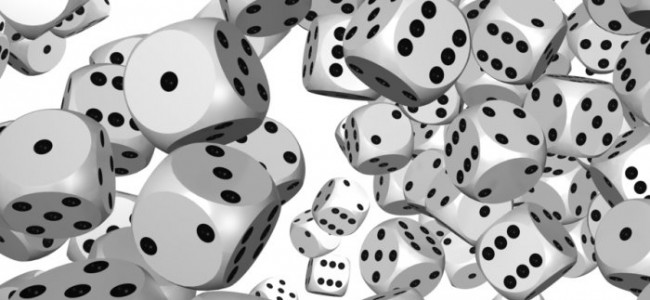Is random fair?
On the one hand, we feel than random selection is the fairest way to do things. Which side gets to choose whether to bat or bowl first in a cricket match is decided by a coin toss. The fixtures in each round of the FA Cup tournament are determined by lottery.
On the other hand, people feel that there is something inherently unfair in picking people at random rather than based on meritocracy. Hence few universities select students (from among a list of eligible candidates) at random. People would be outraged if they did.
What is random?
Then there is the question of what we mean by random. Suppose you toss a coin so that it is random whether it lands of heads or tails. You then cover the coin before anyone sees how it has landed. Is it still random as to whether it is heads or tails? In one sense, it is now determined whether it is heads or tails. However, since no one knows the result, and since it was determined by a random mechanism, we can still think of it as being random.
Just because it’s random doesn’t mean you can’t stack the odds
There is also confusion between completely random and having an element of chance. Not every heavy smoker will get lung cancer; and some people who have never smoked get lung cancer. So, whether or not you get lung cancer is random. But heavy smokers are about twenty times more likely to get lung cancer than never smokers. There is no contradiction here, but it sounds confusing.
Think of it in terms of throwing two dice. If you are a non-smoker then you will only get lung cancer if you throw “double one”. If you are a heavy smoker you will get lung cancer if the total score on the two dice is less than 8. Both are “random” events, but the odds are very different.
There are still patterns to randomness
It doesn’t help matters that the dictionary definition of random might be “without definite aim, rule or method”. When selecting at random using a lottery there is a definite aim – “to be fair”, and a definite method – pull numbered balls out of a bag. The definition of randomness in Wikipedia is also problematic “the lack of pattern or predictability in events”. We know that there are definite patterns that occur in very predictable ways from random events. For instance, if you toss an unbiased coin 200 times you can predict how likely you are to have between 90and 100 heads, or more than 175 heads, or a run of 10 or more heads in a row, or of not having a run of at least 5 heads in a row. It is in fact very difficult to fool a statistician by writing down a series of 200 heads and tails trying to make them look random without actually generating them at random. I had a professor many years ago who would ask the class to write out two such lists for 100 coin-tosses; one based on actual coin tosses the other on what they thought looked random. Most years, out of a class of about 100 students he would correctly identify the forged list for all but 3 or 4 students.
Randomisation is key to clinical trials
So why have we written about randomisation on a cancer prevention blog? Because randomisation is key to obtaining robust evidence in medical and public health research. Whenever experimental units are not identical (and identical units are mostly only possible in physics and chemistry – no two people are identical) randomisation is essential for avoiding bias and for making valid inference (estimating the role of chance in the results). Consequently, clinical trials whether of drugs, behavioural interventions, or health service interventions rely on randomisation. But that brings ethical questions as we shall discuss in a future blog post.
The views expressed are those of the author. Posting of the blog does not signify that the Cancer Prevention Group endorse those views or opinions.

